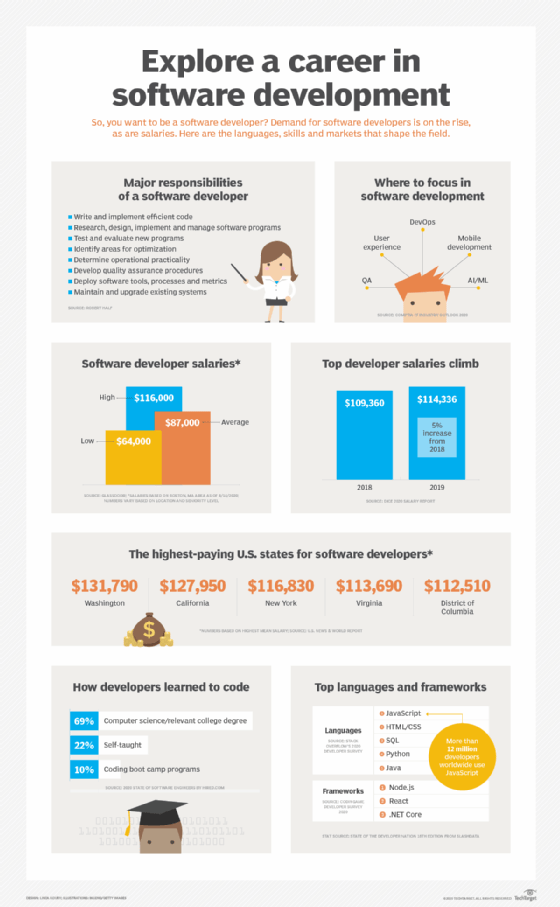
Grafvision - Fotolia
The top software developer skills, tools and certifications
Now tasked with managing complex enterprise software systems, the depth of skills and breadth of knowledge needed by developers has never been more profound.
Modern software development is about a lot more than just typing code. A developer's job requires a wide array of technical and non-technical proficiencies that allow them to design, implement, test and integrate complex enterprise applications. This also requires a consistently sharpened knowledge of development and management tools available to meet the requirements of various projects.
Luckily, there are some very specific software developer skills and areas of expertise that can turn a low-level programmer into a powerful software design lead. Let's take a look at seven of these vital skills and qualifications.
Coding and language skills
To set the foundation for a successful career, software developers must acquire and demonstrate proficiency with well-established programming languages like Java, Python, C#, Ruby and C++. Those versed in several languages and coding styles can stand out by participating in a variety of different software projects across the business and gaining a broader understanding of programming fundamentals.
Successful coding also demands a keen eye for mistakes and opportunities to improve performance. There are potentially limitless numbers of ways to use code to solve any given problem, but some approaches will better suit your project than others. On top of that, errors in syntax and structure will result in broken code that doesn't behave as expected -- if it functions at all. Software developers must be able to create efficient code while simultaneously identifying and fixing defects in the overall code base.

Architecture design and management skills
It's a smart idea to approach software projects with some kind of understanding of the architectural structure and decisions that will ultimately govern the overall project. The design of the architecture and the choices made around it will profoundly impact every application's functionality, complexity and maintainability.
Ultimately, senior engineers and architects will make the final decisions surrounding the architecture. However, career advancement often leads developers into roles like this where these far-reaching decisions are their responsibility. As such, it's a smart idea for all developers to learn about the importance of design processes and understand the implications of specific architectural choices.
Some of the architectural design elements that developers should try and understand include:
- The programming language or languages the architecture supports;
- The architecture's functional routines, components and modules;
- The fundamentals of object-oriented design and programming; and
- Commonly used deployment options, such as containers and public cloud.
Networking and security skills
Most enterprise software systems must operate over large, complex networks, which impose additional demands on programmers trying to maintain performance and availability. To bolster their software developer skills, they need to understand how these networks operate across the seven Open Systems Interconnection (OSI) levels and the choices that go into communication and data exchanges. For example, developers must consider how a certain application behaves during large data transfers, as well as the level of tolerance it has for network failures.
In addition to specific communication processes, it's also important to understand the relationship between networking and security. Network exchanges are often vulnerable to eavesdropping, which continually puts sensitive business data at risk. Developers don't need to be total encryption experts, but they absolutely should understand widely-used encryption protocols, such as TLS for web transfers, and brush up on fundamental data protection techniques.
Database integration and management skills
Enterprise-level databases retain and catalogue massive amounts of mission-critical business data. The applications that spawn from development projects will likely need to integrate with one or more databases and find a way to process diverse sets of information. For example, a developer may need to create code that reads a data set and performs complex calculations. This will likely require a basic understanding of data structures, algorithms and read/write operations.
Developers shouldn't force themselves to become masters of database management, but they should at least gain an understanding of how a database works, the information contained within, and how to query the data sets. It's also important to explore database languages and types such as SQL and NoSQL, as well as cloud database services like AWS Redshift and Google's Cloud SQL.
Application testing and monitoring skills
Every application build is subject to rigorous testing that evaluates its stability, vulnerability and functionality. Successful software developers are discerning investigators who can logically validate the performance of an application against business requirements and technical benchmarks.
Part of this involves identifying the metrics that accurately measure performance, locating security risks and revealing opportunities for optimization. This also means that developers should familiarize themselves with approaches such as blue/green, exploratory, integration and unit testing.
Keep in mind that testing is often a collaborative effort among many business units, including other development teams, QA/test specialists, security groups and end users. This high level of interaction makes it critical for developers to sharpen their communication skills and maintain open dialogues with other business groups.
Platform and tooling expertise
Software departments rely on a vast array of tools and platforms that support application development and management efforts. Given the fast-paced build cycles typical of modern Agile development efforts, developers may find themselves using dozens of different tools on any given day. This is why a familiarity with a wide range of tooling is such an important software developer skill.
These are some of the most important tool types developers should focus on:
- Source code editors. Developers need a means of entering and refining code. Source code editors, such as Atom and Komodo Edit, are text editors tailored for programming that allow developers to type, format and edit commands in a variety of languages.
- Compilers and debuggers. Once code is typed into an editor, compilers are used to translate human-readable code into machine-readable code. Debuggers are used to check the program code for errors in syntax, arguments and other common oversights during the translation process.
- Version control and repositories. Version control tools such as Git, Subversion and Mercurial are used to track updates and breaking changes. Repositories, such as GitHub, Bitbucket and SourceForge, store logs, documentation and other needed resources related to versioning.
- Code analysis tools. Large collections of code often contain errors that cause breakages and security vulnerabilities. Code checkers, such as SonarQube, Coverity and Yasca, specialize in analyzing code for potential problems and can assist in remediating identified issues.
- Automated testing tools. Due to the size and complexity of modern applications, manual performance and security tests are not an option. Developers should get comfortable with automated testing tools such as Selenium, Cucumber and Appium.








